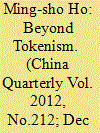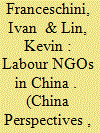| Srl | Item |
| 1 |
ID:
116491


|
|
|
|
|
| Publication |
2012.
|
| Summary/Abstract |
This article challenges the accepted view that during the period of martial law Taiwan's labour unions were "a useless token." Focusing on the petroleum and sugar industries, I analyse the incremental process of how party-state control over the labour unions was converted by the workers themselves in Taiwan's national enterprises. In the early 1950s, the KMT's policy of unionizing enterprises was a complementary strategy to reinforce its slow and unsuccessful party-state penetration. With the unions' prominent role in welfare provision, workers were encouraged to develop a sense of stakeholdership. Over the years, labour unions legitimatized the interests of worker members and thus gave rise to an explosion of claim-making activities - what I call "petty bargaining." By the mid-1980s, labour unions, although still dominated by the KMT, were no longer a Leninist transmission belt, but rather functioned as a de facto complaint centre - an often overlooked precondition for the rise of post-1987 independent labour unionism.
|
|
|
|
|
|
|
|
|
|
|
|
|
|
|
|
| 2 |
ID:
169210


|
|
|
|
|
| Summary/Abstract |
Since their appearance in the mid-1990s, Chinese labour NGOs have mostly focused on disseminating labour law and guiding labour disputes through official channels. In so doing, they have assisted the Chinese Communist Party in achieving its paramount goal of maintaining social stability. In line with this approach, activists in these organizations have traditionally framed their work in terms of “public interest” or “legality,” both of which resonate with the hegemonic discourses of the Party-state. However, earlier this decade a minority of Chinese labour activists began to employ some new counterhegemonic narratives centred on the experience of the labour movement and the practice of collective bargaining that attempted to recode the proletarian experience outside of its official representation. In this paper we analyze this discursive shift through the voices of the activists involved, and argue that the rise of these new counterhegemonic voices was one of the reasons that led to the Party-state cracking down on labour NGOs.
|
|
|
|
|
|
|
|
|
|
|
|
|
|
|
|
| 3 |
ID:
166100


|
|
|
|
|
| Summary/Abstract |
Since their appearance in the mid-1990s, Chinese labour NGOs have mostly focused on three kinds of activities: establishing workers’ centres; carrying out outreach programs on labour rights; and conducting social surveys and policy advocacy. Some scholars have strongly criticised this approach, considering it excessively unbalanced towards an individualistic and narrowly legalistic view of labour rights and thus in line with the political agenda of the Party-state. Still, in the past few years, as labour conflict intensified, a handful of labour NGOs have moved forward to adopt a more militant strategy focussed on collective bargaining and direct intervention into worker collective struggles. Based on dozens of interviews with labour activists and workers and detailed analysis of two case studies of NGO-fostered collective labour mobilisation in Southern China in 2014-2015, this paper will outline the personal and political reasons that motivated these organisations to move beyond a narrow legalistic approach and turn towards collective struggles. It will also describe the strategies that Chinese labour activists have adopted in dealing with collective cases. We will conclude by examining the main challenges that labour activists in China have to face when dealing with labour unrest and by questioning the sustainability and feasibility of this new approach in the current political climate.
|
|
|
|
|
|
|
|
|
|
|
|
|
|
|
|